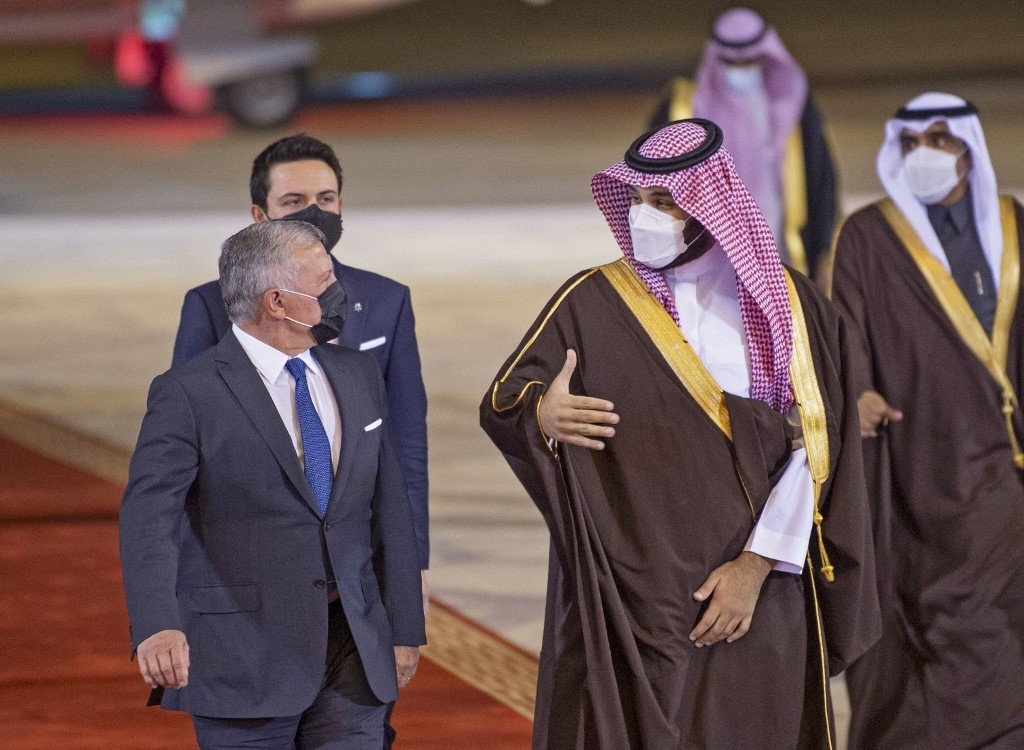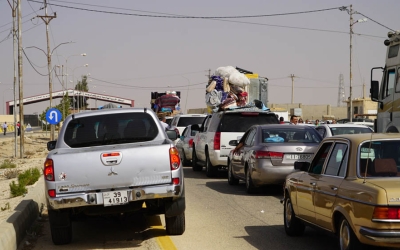Jordan charts path to normal relations with Syria, despite Daraa fighting

Recent fighting in Daraa has complicated Jordan's efforts to normalise relations with the government of President Bashar al-Assad in Syria, underscoring the difficulty regional neighbours face as they try to renew ties with a country grappling with international isolation and 10 years of brutal conflict.
Fighting erupted in Syria's southern province of Daraa late last month as pro-government forces carried out shelling and ground assaults in Daraa al-Balad, a former resistance hub which has remained under the control of former rebel fighters.
The fighting was some of the most intense since pro-government forces retook the province in 2018 under a patchwork of Russian-brokered reconciliation deals with rebel fighters.
The UN says 18,000 civilians fled the fighting as pro-government forces blocked checkpoints and cut off water, electricity, and food - leading the UN High Commissioner for Human Rights Michelle Bachelet to describe the situation as, in effect, a siege.
Some analysts have attributed the recent outbreak of fighting to the refusal of residents in Daraa to participate in Assad's widely disputed re-election in May, as well as continued anti-government protests in the area.
Others say the government was merely looking for a chance to begin an assault on Daraa, home to Syria's only operational border crossing with Jordan.
Amman-based analyst Amer Sabaileh told Middle East Eye that the Syrian government may be looking to consolidate its hold on the strategic southern province, with an eye towards further normalisation.
Shortly before the fighting broke out, the Interior Ministers of Jordan and Syria spoke by phone and agreed to fully reopen the Naseeb-Jaber border crossing. Due to the fighting, Jordan has had to walk back on the full reopening.
"I think it was obvious we would reach this point," Sabaileh said of the assault on Daraa. "It was obligatory for Damascus. Syria can't go back to relations with Jordan without taking back full control of the border area."
'We want to do business with Syria'
Jordan's King Abdullah was one of the first Arab leaders to call on Assad to step down in 2011, but as the government, backed by Russian and Iranian military support, has clawed back territory, the monarch has gradually shifted tone.
In 2018, Jordan appointed a chargé d’affaire to its embassy in Damascus, upgrading diplomatic ties after recalling its ambassador in 2011 at the outbreak of the conflict.
The two countries partially reopened the Nasseb-Jabeer border crossing in 2018 and visiting business and diplomatic delegations are becoming more common inside the capitals of Damascus and Amman.
On his recent visit to Washington last month, the king - a staunch US and Western ally - said the Syrian government was "there to stay", and emphasised the need for dialogue with Damascus.
Oraib Rantawi, founder of the Amman-based Al Quds Center for Political Studies, told MEE that one of the priorities of the king's visit to Washington was to lobby for exceptions to Syrian sanctions.
"We want to do business with Syria. It would be good for the Jordanian economy," Rantawi said. "We can't keep our border closed with Syria forever."
Jordan's economy has been deteriorating for a number of years, with gross domestic product (GDP) declining since 2009. The conflict in Syria has also weighed heavily on Jordan's fragile economy with the country hosting nearly 1.3 million Syrian refugees.
But it remains to be seen whether the king's lobbying has paid off, Amman-based political analyst Omar al-Sharif told MEE: "You don't see it publicly, but behind the scenes, Jordan is pushing really hard to get exemptions from the Syrian sanctions."
Amman hopes that reopening the border can jump-start trade, providing an economic boost to cities in the north such as Irbid and Ramtha, which depended heavily on commerce along the border before the war.
Jordan also aims to serve as a transit point for Syrian products into the Gulf, positioning itself to play a role in the country's reconstruction, which is estimated to cost between $250bn and $400bn.
Pressure from Washington
Jordan is certainly not alone in trying to position itself relative to a postwar Syria where Assad remains in place.
Both the United Arab Emirates and Saudi Arabia, once staunchly opposed to Damascus, have moved past overtures to more overt engagement. The UAE reopened its embassy in Syria 2018, while Saudi Arabia sent a high-level delegation - headed by its intelligence service chief - to meet with Assad in May.
The Biden administration doesn't, however, appear ready to change course just yet. Last month it imposed new sanctions on Syrian government officials, prisons, and militia leaders.
Speaking to reporters before the sanctions were announced, Joey Hood, the US assistant secretary of state for Near East Affairs, warned countries against conducting business in Syria, and said Washington was ready to utilise secondary sanctions to punish those who normalise relations.
Bipartisan support for sanctions remains prevelant in congress.
Republican congressman Lee Zeldin told MEE, "Maintaining strict sanctions on Syria is essential to pushing back on the atrocities of the Assad regime and depriving Assad of resources, as well as ensuring the safety of Syrian neighbors and US allies, Israel and Jordan."
The most sweeping of US sanctions on Syria are the Caesar Sanctions, passed into law under the Trump administration.
The act is named after a Syrian military photographer who smuggled tens of thousands of gruesome photos out of the country, documenting evidence of war crimes.
The legislation gives the US the ability to sanction entities that engage in the country's reconstruction and engineering sectors, with the aim of preventing Assad's government from benefiting financially.
Besides the risk of sanctions, the fighting over Jordan's northern border is a reminder that, while the Assad government has survived, it is fragile - and continues to rely on proxies to project power.
The forces heading the assault on Daraa are from the Fourth Division of the Syrian Army, with close links to Iran, and militias backed by Tehran have taken a leading role in trying to recapture Daraa.
Iranian threat
Omar al-Raddad, a former officer in the Jordanian General Intelligence Directorate (GID), told MEE that Iranian militias deliberately cut off the main road from the border crossing in Syria.
"It seems there are parties within the Syrian regime that are not satisfied with the return of relations with Jordan, including those affiliated with Iran," Raddad said.
Even as Jordan looks to reopen its border leading into the province, Raddad said there were serious concerns in Amman about the region being consolidated under the control of Iranian forces.
"The information about Iranian militias is troubling and the entry of terrorist factions into the confrontation [is extremely worrying]," he told MEE.
In 2014, King Abdullah coined the phrase "Shia crescent" in a speech where he warned about the expansion of Tehran's political and military power across the region.
On his visit to Washington in June, the king said Jordan had come under increasing assault from Iranian drones and had been the target of cyberattacks emanating from the Islamic Republic.
Jordan believes engaging with the Assad government will give Amman more leverage in the country at a time when the US is pivoting away from the region to deal with great power threats from China and Russia.
MEE reached out to the White House about the role of Iranian fighters in the conflict in Daraa and was told by a senior administration official that the US was "concerned about the fighting".
"We are focusing our efforts on providing aid to the newly displaced and call on the Assad regime to immediately grant uninterrupted access to humanitarian actors on the ground," the official added.
Sabaileh said Washington's inability to provide a solution to the conflict was one reason Jordan felt it must reach out to the Assad government.
"What does Biden have for Syria today? It is an open crisis, which is fine for him because he's in DC, but it's on our borders," he told MEE.
Middle East Eye delivers independent and unrivalled coverage and analysis of the Middle East, North Africa and beyond. To learn more about republishing this content and the associated fees, please fill out this form. More about MEE can be found here.








